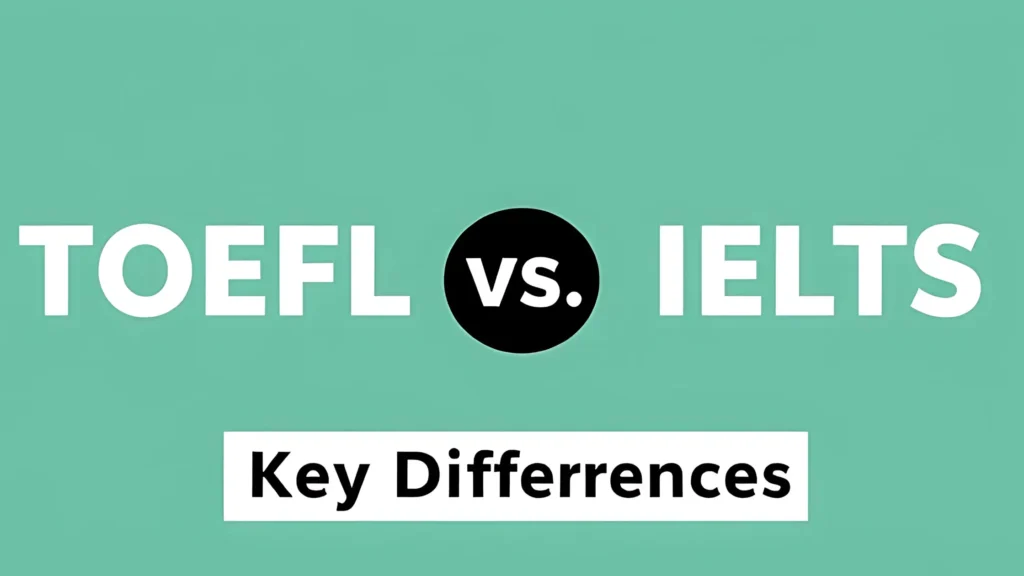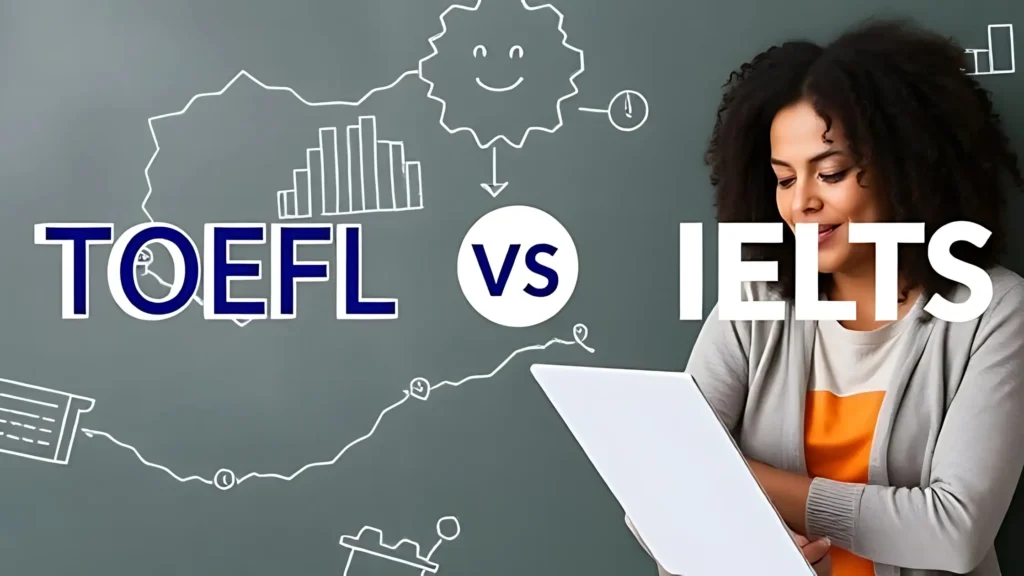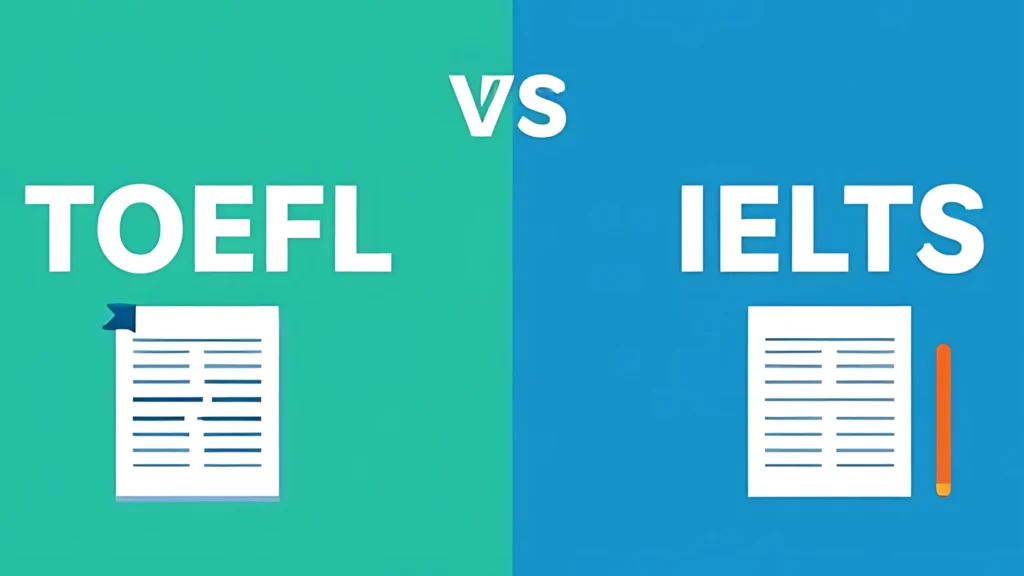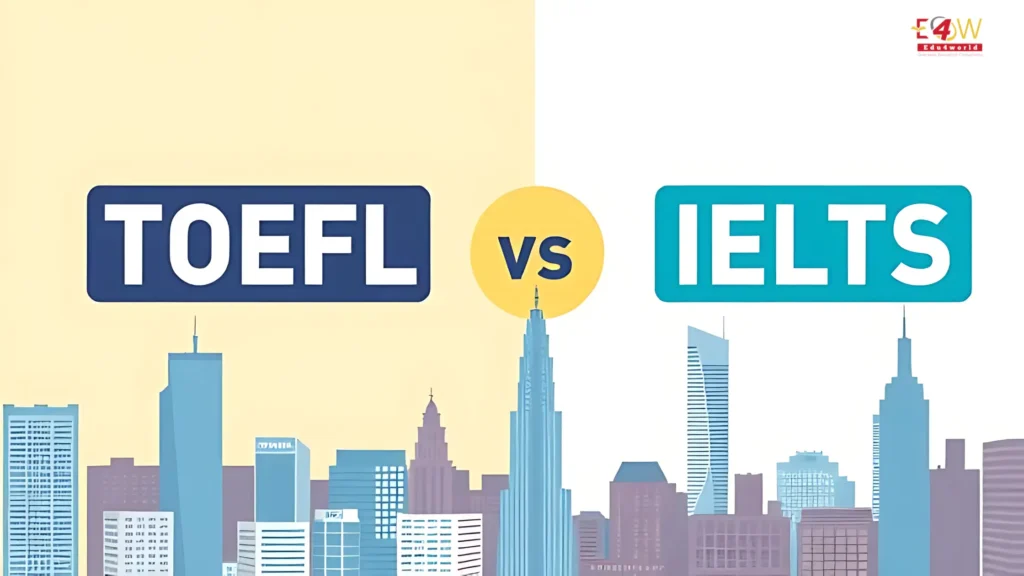In today’s globalized world, English proficiency is crucial for academic, professional, and personal growth. Whether you’re planning to study abroad, immigrate to an English-speaking country, or advance your career, proving your English language skills is often a prerequisite. The TOEFL (Test of English as a Foreign Language) and the IELTS (International English Language Testing System) are two of the most well-known assessments of English competence. However, how can you choose the best one for you? In this in-depth guide, we’ll explore the key differences between TOEFL vs IELTS, their formats, scoring systems, and which test might be better suited to your needs.
Table of Contents
Understanding TOEFL and IELTS: An Overview
What is TOEFL?
The Educational Testing Service (ETS) administers the TOEFL, a test of English ability. Students applying to institutions in the US, Canada, and other English-speaking nations particularly use it for academic purposes. The test evaluates your ability to understand and use English at the university level.
What is IELTS?
Another popular test of English competence is the IELTS, which the British Council jointly administers, IDP: IELTS Australia, and Cambridge Assessment English. There are two variants: General Training (for employment and immigration purposes) and Academic (for students). In nations including the UK, Australia, Canada, and New Zealand, IELTS is accepted by educational institutions, employers, and immigration officials.
Also Read
Germany Student Visa Made Easy: Step-by-Step Guide
TOEFL vs IELTS: Key Differences

When comparing TOEFL vs IELTS, it’s essential to understand their differences in structure, content, and scoring. Here’s a breakdown:
1. Test Format
- TOEFL: The TOEFL is conducted entirely online (iBT – Internet-Based Test) and includes four sections: Reading, Listening, Speaking, and Writing. The test lasts about 4 hours.
- IELTS: The IELTS offers flexibility with both paper-based and computer-based options and comprises four sections: Listening, Reading, Writing, and Speaking. Notably, the Speaking section involves a direct, in-person interaction with an examiner. The entire test duration is 2 hours and 45 minutes.
2. Scoring System
- TOEFL: The TOEFL is scored on a 0 to 120 scale, where each of the four sections—Reading, Speaking, Listening, and Writing—contributes up to 30 points toward the total score. The scores are then added together for the final result.
- IELTS: The IELTS follows a band score system that ranges from 0 to 9. Each of the four sections is assessed separately, and the overall band score is calculated as the average of these individual section scores.
3. Accents and Vocabulary
- TOEFL: The TOEFL primarily uses American English, including accents and vocabulary. This makes it a preferred choice for students targeting U.S. universities.
- IELTS: The IELTS incorporates a variety of English accents, including British, Australian, and American. This makes it more versatile for test-takers planning to study or work in multiple English-speaking countries.
4. Speaking Section
- TOEFL: The Speaking section involves responding to prompts via a microphone. Examiners record your answers and review them.
- IELTS: An in-person interview with an examiner makes up the Speaking segment. This format allows for a more interactive and natural conversation.
5. Writing Section
- TOEFL: The Writing section includes two tasks: an integrated task (reading a passage and listening to a lecture, then writing a response) and an independent task (writing an essay on a given topic).
- IELTS: The Writing section also has two tasks. In the Academic version, Task 1 involves describing a graph, chart, or diagram, while Task 2 is an essay. In the General Training version, Task 1 is letter writing, and Task 2 is an essay.
Also Read
What is IELTS? A Guide to the International English Language Testing System
Preparing for The TOEFL IELTS Exam
The TOEFL IELTS exam is a crucial step for students and professionals aiming to study or work in English-speaking countries. Although the methodology, scoring, and goal of the two tests vary, they both evaluate your command of the English language. The TOEFL exam is often preferred by American institutions, while the IELTS exam is widely accepted in the UK, Australia, and Canada. To ace the TOEFL IELTS exam, start by understanding the test structure, practicing regularly, and focusing on your weak areas. Utilize online resources, mock tests, and expert guidance to build confidence.
Key Points to Remember for the TOEFL IELTS Exam:
- Understand the differences between TOEFL and IELTS to choose the right exam for your goals.
- Learn the format of the test, including the sections on speaking, writing, listening, and reading.
- Practice with authentic TOEFL IELTS exam materials to improve time management and accuracy.
- Focus on enhancing your vocabulary, grammar, and pronunciation for a higher score.
- Take full-length mock tests to simulate exam conditions and track your progress.
- Seek professional guidance or join preparation courses if needed.
- Stay consistent and motivated throughout your TOEFL IELTS exam preparation journey.
By following these tips and dedicating time to practice, you can confidently approach the TOEFL IELTS exam and achieve your desired results.
TOEFL vs IELTS: Which Test Should You Choose?

Choosing between TOEFL vs IELTS depends on your goals, preferences, and the requirements of the institution or organization you’re applying to. Here are some factors to consider:
1. Purpose of the Test
- TOEFL: If you’re applying to universities in the U.S. or Canada, the TOEFL is often the preferred choice. Many American institutions are more familiar with TOEFL scores.
- IELTS: If you’re targeting universities in the UK, Australia, or New Zealand, or if you’re applying for immigration purposes, the IELTS is generally more widely accepted.
2. Test Format Preference
- TOEFL: If you’re comfortable with a computer-based test and prefer a standardized format, the TOEFL might be a better fit.
- IELTS: If you prefer a face-to-face Speaking test or are more comfortable with a paper-based format, the IELTS could be the right choice.
3. English Accent Familiarity
- TOEFL: If you’re more accustomed to American English, the TOEFL will likely feel more familiar.
- IELTS: If you’re comfortable with a variety of English accents, the IELTS offers a more diverse experience.
4. Scoring and Results
- TOEFL: The TOEFL provides a single overall score, which can be easier to interpret for some test-takers.
- IELTS: The IELTS band score system offers more granularity, allowing you to showcase strengths in specific areas.
TOEFL vs IELTS: Preparation Tips

Regardless of which test you choose, thorough preparation is key to achieving a high score. Here are some tips for both TOEFL vs IELTS:
TOEFL Preparation Tips
- Practice Typing: Since the TOEFL is computer-based, improving your typing speed and accuracy can save time during the test.
- Familiarize Yourself with the Format: Take practice tests to get comfortable with the TOEFL’s structure and timing.
- Work on Note-Taking: The integrated tasks in the Listening and Speaking sections require effective note-taking skills.
- Use Official ETS Resources: ETS offers a range of preparation materials, including practice tests and sample questions.
IELTS Preparation Tips
- Practice Speaking with a Partner: Since the IELTS Speaking section is face-to-face, practicing with a partner can help you feel more confident.
- Focus on Task 1 and Task 2 in Writing: Understand the specific requirements for each task in the Writing section.
- Listen to Different Accents: Familiarize yourself with British, Australian, and American accents to prepare for the Listening section.
- Take Mock Tests: Simulate the test environment by taking full-length practice tests under timed conditions.
TOEFL vs IELTS: Which is Easier?
The difficulty of TOEFL vs IELTS is subjective and depends on your strengths and weaknesses. Some test-takers find the TOEFL’s computer-based format more straightforward, while others prefer the IELTS’s face-to-face Speaking test. Here’s a quick comparison:
- TOEFL: Easier for those comfortable with multiple-choice questions and computer-based tests.
- IELTS: Easier for those who prefer a more traditional test format and face-to-face interaction.
TOEFL vs IELTS: Acceptance and Recognition
Both TOEFL vs IELTS are widely accepted, but their recognition varies by country and institution:
- TOEFL: More commonly accepted in the U.S. and Canada.
- IELTS: More commonly accepted in the UK, Australia, and New Zealand.
It’s essential to check the specific requirements of the institution or organization you’re applying to.
FAQs: TOEFL vs IELTS
1. What distinguishes the TOEFL from the IELTS?
The primary difference lies in their format and structure. The TOEFL is entirely computer-based, while the IELTS offers both paper-based and computer-based options. Additionally, the IELTS Speaking section is conducted face-to-face with an examiner, whereas the TOEFL Speaking section involves recording responses via a microphone.
2. Which test is more widely accepted: TOEFL or IELTS?
Both tests are widely accepted, but their popularity varies by region:
TOEFL: More commonly accepted in the U.S. and Canada.
IELTS: More commonly accepted in the UK, Australia, New Zealand, and for immigration purposes.
Always check the specific requirements of the institution or organization you’re apply
3. Is TOEFL Easier Than IELTS?
The difficulty of TOEFL versus IELTS depends on the individual’s strengths and preferences. TOEFL is entirely computer-based and focuses more on academic English, making it easier for those comfortable with multiple-choice questions and typing. IELTS, on the other hand, includes a face-to-face speaking test and a mix of question types, which some find more intuitive. Neither is inherently easier; it depends on your skills and test-taking style.
4. Which test is easier: TOEFL or IELTS?
The difficulty of TOEFL vs IELTS depends on your strengths and preferences:
If you’re comfortable with multiple-choice questions and computer-based tests, you may find the TOEFL easier.
If you prefer face-to-face interaction and are comfortable with a variety of English accents, the IELTS might be easier for you.
5. What is 7.5 IELTS Equivalent to in TOEFL?
A 7.5 IELTS score is roughly equivalent to a 102-109 on the TOEFL iBT. Both scores indicate an advanced level of English proficiency, suitable for most academic and professional purposes.
6. How long are the TOEFL and IELTS tests?
TOEFL: Approximately 4 hours.
IELTS: 2 hours and 45 minutes.
7. Which Certificate is Better, TOEFL or IELTS?
The choice between TOEFL and IELTS depends on your goals:
TOEFL is preferred for American universities and institutions that require a computer-based test.
IELTS is widely accepted in the UK, Australia, Canada, and other countries, and is often chosen for immigration purposes.
Both are equally respected, so choose based on the requirements of your target institution or organization.
8. How are the TOEFL and IELTS scored?
TOEFL: Scored on a scale of 0 to 120, with each section (Reading, Listening, Speaking, Writing) worth 30 points.
IELTS: Scored on a band scale of 0 to 9, with each section scored individually. The overall band score is the average of the four section scores.
9. Is TOEFL Easy for Indian Students?
TOEFL can be relatively easier for Indian students who are accustomed to computer-based tests and have strong reading and listening skills. However, the academic nature of TOEFL can be challenging for those less familiar with formal English. Indian students with a good grasp of American English and academic vocabulary often find TOEFL manageable.
Conclusion:
Choosing between TOEFL vs IELTS is a significant decision that can impact your academic and professional future. By understanding the differences in format, scoring, and acceptance, you can make an informed choice that aligns with your goals. Whether you opt for the TOEFL’s computer-based structure or the IELTS’s diverse accents and face-to-face Speaking test, thorough preparation is the key to success.
Remember, both tests are designed to assess your English proficiency, so focus on improving your language skills rather than worrying about which test is “easier.” With the right mindset and preparation, you can excel in either TOEFL vs IELTS and take the next step toward achieving your dreams.
Also Read
PTE Score in Bands: Complete Guide to Understanding Your PTE Scores









